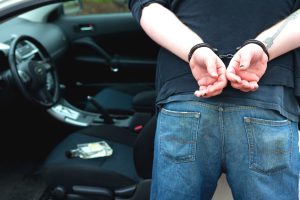Any Florida DUI arrest carries the potential for hefty fines, driving restrictions, possible jail time – to say nothing of the impact it could have on your job, your personal relationships, and your reputation. Even so, the law – and to some extent, society – tends to treat first-time DUI offenders who haven’t hurt anyone as being largely redeemable – so long as you pay your dues, learn from your mistakes, and avoid making them again. However, if you’re arrested for a Florida DUI and it’s your second or subsequent offense, the consequences are suddenly a whole lot steeper. If you’re accused of being a repeat DUI offender is strongly advised to hire a good DUI defense attorney as soon as possible. 
As our Broward DUI defense lawyers can explain, Floridians report a higher-than-average percentage of adult drivers who admit to driving after drinking too much. The Florida Department of Law Enforcement reports more than 29,000 drivers were arrested for DUI offenses in the Sunshine State in 2020 – down slightly from nearly 34,000 in 2019.
It’s estimated 1 in 3 people arrested for DUI in Florida is a “repeat offender” with prior offenses on their record. There are more than 113,000 people in Florida with at least 3 DUIs on their record. There are nearly 12,000 with five or more prior DUI arrests. Some of these individuals still retain their driving rights (though usually with limitations such as to-and-from work and with mandatory ignition interlock devices on their vehicles). Mothers Against Drunk Driving reports at least 300,000 motor vehicle trips every single day in this country involve an impaired driver. Of those, about 4,000 are arrested. Those with prior
The penalties for driving under the influence in Florida increase with every prior offense.
Consequences for Conviction of DUI in Florida – 1,st 2nd, 3rd+ Time Around
If you’ve had prior DUI convictions and are arrested again, you may think you “know the drill.” But you need to be prepared for police and prosecutors to take your case much more seriously. Sentencing guidelines will skew in favor of jail time and stiff fines.
As outlined in F.S. 316.193, penalties for DUI are as follows:
 First-Time Offender
First-Time Offender
- Fines: Maximum $1,000. Up to $2,000 if a child was in the car or your blood-alcohol concentration hit 0.15% or more. If someone was seriously injured, you could pay as much as $5,000.
- Jail: Maximum 6 months in jail. Most people don’t serve this much, but your chances increase if you had a child in the car and/or your BAC was 0.15% or higher. (In either of those situations, you could face up to 9 months in jail.) If you’re involved in a crash, maximum penalty goes up to 1 year in jail. If you cause a crash AND someone was seriously hurt, it’s a third-degree felony, and you could be facing 5 years in prison.
- Probation: Maximum 1 year. (Your probation + jail time can’t = more than 1 year.)
- Community service: 50 hours
- Driver’s license penalties: Maximum 1 year suspension. That’s according to Florida criminal statutes. You may also face an additional 6 months of administrative penalty suspensions, though these typically overlap. Note: You only have 10 days to file a challenge to a license suspension order via a formal review hearing request. You can be issued a temporary driver’s license in the interim immediately following your arrest/citation, but after that 10 days, you’re going to be without legal driving privileges, at least for a little while. This is one reason to hire a lawyer right away.
- Ignition interlock device: It’s up to the discretion of the judge, but this can be imposed temporarily for a first-time offense. If you’re BAC was 0.15% or higher or you had a child in the car, that’s an automatic 6 months of ignition interlock – which you must pay to install and maintain.
- Vehicle impound : Up to 10 days.
Second-Time Offender
- Fines: Maximum $2,000 – though up to $4,000 if you had a child in the car or your BAC was 0.15% or higher. If you cause an accident resulting in major injuries, your maximum fine shoots up to $5,000.
- Jail: If this is your second offense within a 5-year period (even if the prior offense was out-of-state), you will serve a minimum of 10 days, and a maximum of 9 months behind bars. If you have the aggravating factor of a high BAC OR a minor in the car OR you caused property damage OR you caused injuries, maximum penalty goes up to 1 year in jail. If you seriously hurt someone in a crash, it’s a third-degree felony with a maximum 5-year prison term.
- License: If your last DUI was within the last 5 years, your license will be administratively suspended for 12 months.
- Mandatory ignition interlock device: Minimum of 1 year, at your own expense. Longer, if the judge decides it should be longer.
Third-Time Offender
Third-time DUI convictions are third-degree felonies in Florida – assuming your most recent prior conviction was within the last 10 years. If your last offense was more than 10 years ago, it’s treated like a first-degree misdemeanor – though your prior offenses will likely be weighed by the court. If you agree to a plea deal on your third DUI, the case may be prosecuted as either a felony or misdemeanor. (Some states call offenses like this a “wobbler,” as it can wobble between a misdemeanor and felony, at the prosecutor’s discretion.) The difference in penalties and long-lasting impact to your life is infinitely worse with a felony than a misdemeanor – which is why calling a defense lawyer immediately is in your best interests.
- Fines: Minimum $2,000, maximum $5,000.
- Jail: At least 30 days (assuming your last conviction was within the past decade), and up to 1 year in jail.
- License: At least 10 years of license revocation. As outlined in F.S. 322.24 and F.S. 322.28(2)(a)(3), if you’ve been convicted of DUI on three separate occasions (in Florida or out-of-state) and the most recent offense before this was within the last decade (from the date of the offense, not conviction), you’ll lose your license for the next 10 years.
- Mandatory ignition interlock device: 2 full years, at your sole expense. This, of course, is only applicable when you do finally qualify for a permanent or restricted license following a period of revocation.
Fourth-Time Offender
These penalties apply if you have 3+ prior convictions and are now facing a fourth – regardless of how long ago the previous offenses occurred. It’s a third-degree felony.
- Fines: Minimum $2,000, maximum up to $5,000.
- Jail: Up to 5 years in prison.
- License: Permanent revocation.
- Probation: Up to 5 years.
Ignition interlock doesn’t apply, as you are no longer allowed to drive after your fourth or subsequent DUI conviction.
Bottom line: If you’re arrested for a DUI in Fort Lauderdale, and you already have prior convictions on your record, it is imperative that your case be handled with expert precision by a defense lawyer who is highly experienced and has a track record of success in cases involving repeat offenses. Even if it’s not possible to have the charges dismissed outright, we can often minimize the overall consequences.
Call Fort Lauderdale Criminal Defense Attorney Richard Ansara at (954) 761-4011. Serving Broward, Miami-Dade and Palm Beach counties.
Additional Resources:
Florida DUI and Administrative Suspension Laws, DUI and IID, Florida Department of Highway Safety & Motor Vehicles
More Blog Entries:
How Do I Bail Someone Out of Jail in Fort Lauderdale? December 15, 2022, Broward Criminal Defense Lawyer Blog
 Fort Lauderdale Criminal Attorney Blog
Fort Lauderdale Criminal Attorney Blog


